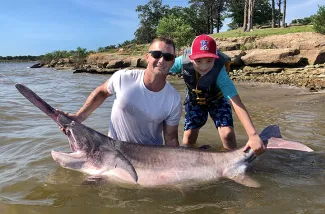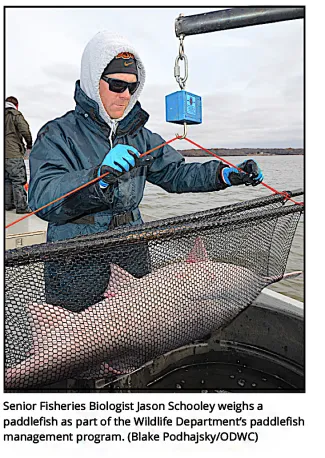
A fishing guide who normally gives clients a chance to snag a big Oklahoma paddlefish outdid himself May 23 when he hauled in a 143-pound giant that was certified the official state record for that species, beating the previous record by a whopping 10.5 pounds!
The fish actually missed being a rod-and-reel world record by only about a pound!
Jeremiah Mefford of Kiefer was enjoying some family time at Keystone Lake on the Saturday of Memorial Day weekend when he connected with the huge primitive fish that harkens to prehistoric times. He operates Reel Good Time Guide Service but was taking the day off to spend some time fishing with his wife, Ashley, and his son, Brody.
Because of some unique regulations pertaining to the snagging and harvest of paddlefish, several variables lined up in order for the record paddlefish to be certified by the Oklahoma Department of Wildlife Conservation. These included:
- The fish was snagged on a day when harvest is allowed. (Paddlefish regulations prohibit harvest on Mondays and Fridays, and ODWC will not certify any paddlefish records on those days.)
- The angler had not reached his two-fish annual limit for paddlefish harvest, and therefore he could legally hold and harvest the fish. (Regulations specify no culling, which means a paddlefish cannot be held or restrained but must be released promptly if an angler chooses not to harvest the fish.)
- ODWC employees were nearby and were able to respond in a timely manner to weigh the fish and witness the state-record affidavit.
Mefford wrote about the day’s experience on social media. “It was time to leave … and then came my favorite sentence: ‘Just one more.’ My wife and son both decided to let me reel one in, and of course I’m OK with that. Little did I know it was a true monster!
“This fish had my arms worn out, and I was not quite sure if it was from my lack of working out, or was it a giant? After fighting the fish for several minutes, it surfaced about 40 feet from the boat, and we got our first glimpse along with four other boats watching the battle play out.”
Once Mefford had the paddlefish at the boat, he quickly took a weight and saw 146 pounds. “I then got on the phone with wildlife management, and they immediately headed our way. … The Game Wardens did an outstanding job with the fish from the handling and gathering-information standpoint.”
Senior Fisheries Biologist Jason Schooley was one of two ODWC employees able to rush out to Keystone Lake. He said they “immediately headed to the lake with the scale, cradle, and additional equipment. … We had the fish weighed within 68 minutes of receiving the call, and I felt that was about a best-case-scenario response time.”
Even though Mefford was prepared to harvest the huge fish, he indicated that he would choose to release it if possible. Schooley determined a successful release would be possible, as the angler had shown great concern about the well-being of the paddlefish from the moment he snagged it, and the fish had been treated with great respect. Also, the water temperature was still somewhat cool, which helps with survivability. “Paddlefish are ram ventilators, meaning that they need to swim constantly to get oxygen through their gills. Restraining a paddlefish can often result in mortality, especially in warm water temps,” Schooley said.
As it would be illegal for Mefford to release the fish himself (also known as culling), he agreed to relinquish possession of the live fish to the Wildlife Department so it could be released. Schooley said the fish was resuscitated for about 10 minutes on the boat ramp then moved farther offshore. “When the fish showed signs of vigor, we let loose, watched it sink, and then monitored the fish’s movements using Livescope (sonar). The fish plainly swam into deeper water, remained upright, and we followed its directed swimming for a few minutes until we were convinced that the fish was likely to survive the experience.”
Mefford’s catch was 76 inches in total length and 44.5 inches in girth. The previous state record weighed 132 pounds, 8 ounces, and was snagged about two years ago by Larry Dale Morphew out of the Arkansas River.
Schooley said this case was fortunate in that it resulted in a successful release, which isn’t always the case. He said his decision to release this fish was based on its solid chance of survival and that the angler agreed to relinquish possession. In some cases, the delays required to certify a record fish might result in the fish’s death.
Mefford wrote that he enjoyed visiting with the ODWC personnel. “And best of all, they were able to release the fish, and it swam off vibrantly.”
The paddlefish is a primitive species, with a fossil record dating to the age of the dinosaurs about 75 million years ago. Resembling a shark, it has smooth skin and a skeleton mostly of cartilage.
A long paddle-like blade, called a rostrum, extends forward from the fish’s head. The rostrum is covered with tens of thousands of sensory receptors that enable the fish to detect weak electrical fields produced by zooplankton, its primary food.

The American paddlefish roams lakes and rivers of the Mississippi Basin. Paddlefish were once very abundant across their range but have declined in many areas. These fish can live up to 30 years, and they can grow to huge sizes. The rod-and-reel world record American paddlefish, snagged in Kansas in 2004, weighed 144 pounds. The largest American paddlefish on record, taken by a spearfisherman in Iowa in 1916, reportedly weighed 198 pounds.
Oklahoma’s paddlefish population is seen as among the healthiest in the nation, and the sport of snagging paddlefish draws anglers from many states. The Wildlife Department's paddlefish management program involves an extensive process of netting, weighing, measuring and marking paddlefish with metal bands on the lower jaw. For several months every year, the Department operates a Paddlefish Research Center near Miami, Okla.
Anglers wanting to experience battling these large fish are required to have a state fishing license (unless exempt) and a free paddlefish permit. Regulations for paddlefish snagging can be found here in the Oklahoma Fishing Regulations Guide.
And anyone wanting to arrange a guided paddlefish trip can find a list of state-licensed fishing guides here on the Wildlife Department’s website.
The Wildlife Department is working with the Oklahoma Health Department to craft messaging that promotes responsible outdoor recreation during the COVID-19 outbreak. The Department and health authorities agree that safeguarding mental health is important and spending time outdoors is a great way to do so, while following guidelines issued by federal and state authorities.